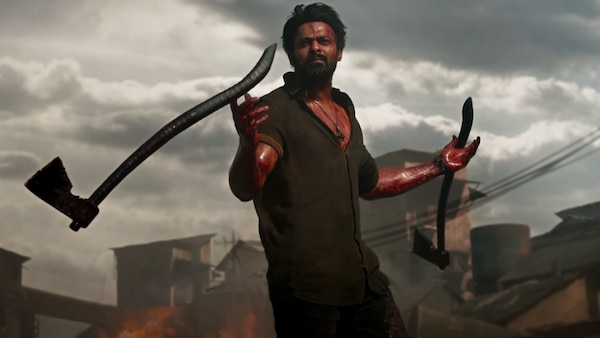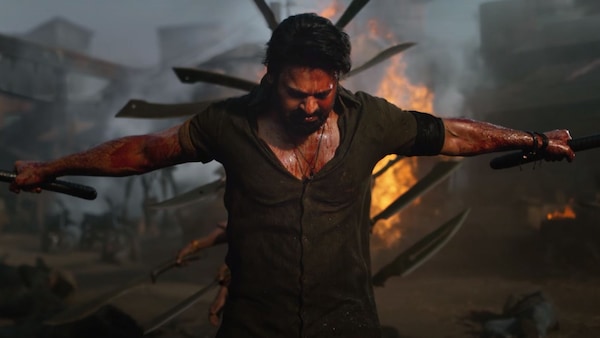Quick Take | Salaar Review — what a waste of Prabhas' talents
Salaar is one of the biggest films in Indian cinema in terms of budget, scale, scope and star cast. Yet, all it is and can be is an opulent exercise in hero-worshipping.

Last Updated: 03.42 PM, Dec 25, 2023
Producers and directors opt for A-list stars to lead extravagant action films for a reason — it's a strategy to attract a broader audience. The privilege we readily grant to superstars like Prabhas, who effortlessly take on armies of well-built men on a high-protein diet, with no concern for realism or logic, may not be extended to newcomers. We not only acknowledge Prabhas' ability to perform superhuman feats but also revel in those moments, setting aside considerations of probability, logic, and morality. This is precisely why directors and producers seek superstars like Prabhas; their presence ensures an easier connection with the audience, garnering confidence and affection. Without such a star, the director faces a monumental challenge in crafting a hero's journey that captivates viewers and encourages them to suspend disbelief and fully engage in the unfolding drama.
Prashanth Neel has failed to grasp this rudimentary fact about the business of mainstream cinema. Had he recognized this, he might not have dedicated over an hour to establish a singular point — that Deva, aka Salaar (Prabhas), is the most lethal weapon on the planet Earth.
The moment we see the silhouette of Prabhas we know, this is the story about a dangerous man with a history steeped in violence. And Prashanth also declared this aspect of this movie in the first look poster with a tagline that read— The Most Violent Men...Called One Man...The Most Violent. On top of it, there were not one but three teaser trailers demonstrating Salaar's massive appetite for violence and bloodshed. In each teaser, the spotlight remained on Prabhas's blood-soaked fist, accentuating the veins bulging from his well-built forearms.
Yet, Prashanth dedicates the entire first half to drive home a singular point — Deva is dangerously, incredibly dangerous, to the extent that it's beyond imagination. The narrative even reaches a point where Deva's mother nearly suffers a heart attack merely from seeing a plastic knife in his hand. Yes, we understand, even a cake knife transforms into a weapon of mass destruction in Salaar's hands. This kind of scene might have elicited unintended laughter and humorous comments if attempted by a less seasoned star. However, many viewers accepted it at face value due to Prabhas.
The point is that Prabhas doesn't need so much build-up. He only needs good scenes and some exciting things to do in the movie, besides brooding atop mountains overlooking the city of Khansar, walking in slow motion, and, yes, slaughtering people. All these elements must serve the story but they shouldn't overshadow the narrative itself.

After spending nearly three hours watching Salaar, you would come out of the theatres having learnt very little about Khansar, the focal point of this whole narrative. This is what we know about Khansar: it stands as an ancient city-state with its own unique set of rules, operating independently of the country's laws. Governed by a king and numerous lords, the city's foundational principle revolves around the powerful dominating the weak without any sense of guilt or remorse. And the most powerful man is always a looming threat to the throne.
There is a significant void in our understanding of the city: a lot remains unknown. What constitutes the primary occupation of the city's residents? If it claims the title of the richest city in the country, the origins of its riches remain a mystery. Are all inhabitants of Khansar involved in criminal enterprises, serving as mob bosses, criminals, or gun suppliers? Is Khansar essentially a Sin City? Does the city's culture solely revolve around an insatiable penchant for violence, or does it harbour more nuanced aspects? The enigmatic women, dressed in red, pose questions about their background and narrative. What fate has befallen the male population in this community? Beyond the imposing city walls, dust-covered landscapes, and regally adorned kings and lords, our knowledge of Khansar is remarkably scant. It is a tragedy especially after the filmmakers have spent a fortune to create this make-believe world only to be reduced to a characterless presence in the narration.
Salaar is also unfair to Prabhas as it doesn't give him a lot to do in the movie. And there are so many logical loopholes in the narration that it's mind-numbing. Take, for example, Prithviraj Sukumaran's Vardharaja Mannar. He brings Deva back to Khansar to safeguard him and his men from his enemies within the city. So we expect to see Vardharaja and Deva work hand-in-hand to overcome the challenges. But, to a large point, the film creates an impression that Vardharaja and Deva never really talked as to what to do about their situation or what must be the course of their action. It doesn't really add up. If Vardharaja didn't intend to use Deva's service, why bring him in at all knowing very well that he was a ticking time bomb?
ALSO READ: Salaar - Prashanth Neel reveals why he picked Prithviraj over a Bollywood star for Prabhas-starrer
Prashanth has employed such outdated narrative jolts in Salaar that it's shocking. The question arises: has our top directors now settled to simple parlour tricks, instead of pushing the envelope of mainstream cinema? Is it just enough to heavily lean in on the larger-than-life persona of our superstars for the amusement of fans, without fully utilizing their talents?
Salaar is one of the biggest films in Indian cinema in terms of budget, scale, scope and star cast. Yet, all it is and can be is an opulent exercise in hero-worshipping. And it doesn't reflect well on our industry.

